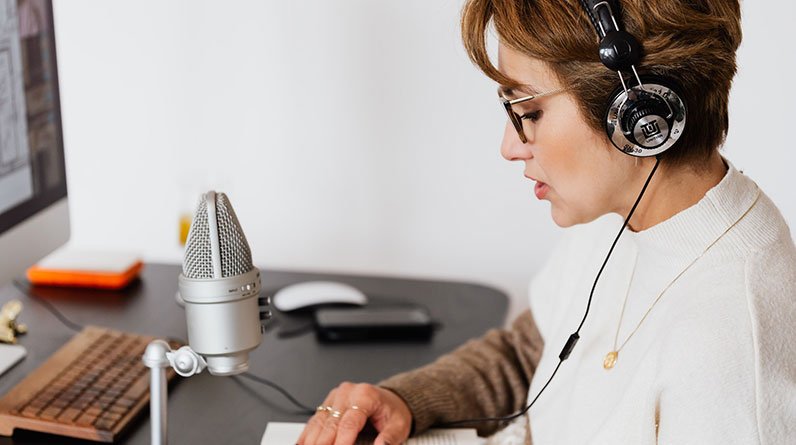
Improving Your Pronunciation
When learning a new language, it’s important to be able to pronounce words accurately. This will ensure that you don’t offend others and that you can read and understand texts properly.
There are a number of techniques you can use to improve your pronunciation. These include listening, singing, talking, and reading.
Listening
One of the most important skills to learn when learning a new language is listening. This is because listening allows you to hear the words and phrases that native speakers use. It also helps you to understand how to speak the language more clearly and fluently.
Listening is a skill that many people find difficult to master, but it can be learned and improved. The first step is to recognize what makes you a bad listener and then work on improving it.
Good listening requires concentration and the use of other senses – not just hearing the words that are being spoken. It also involves taking in the context of the situation and the other person’s point of view.
Another key factor to remember is that listening is a skill that should be practiced frequently. This can be done by listening to a podcast or listening to music in your target language.
It’s important to listen actively and give your full attention when you are listening to a conversation, whether it is with someone face-to-face or on a podcast. You should never try to do something else while listening, such as watching TV or playing games on your phone.
To improve your listening skills, you can practice with a friend or family member who is learning English as well. By practicing together, you will increase your confidence in your ability to speak the language and learn from each other’s mistakes.
Effective listening is a crucial life skill that can help you reach further in your professional career. It also enhances interpersonal relationships and develops strong bonds.
This is because good listening skills develop a close connection between the speaker and the listener that can prove productive in the long run. The speaker can gain a deeper understanding of the listener and his opinions, which will aid him in putting across his message more effectively and efficiently.
Besides, good listening skills will help you build trust with your friends and family. Moreover, it will encourage them to talk about their concerns and share their feelings with you. This will make you feel valued and appreciated in the process.
Singing
Singing is a great way to practice the pronunciation of your new language, as it helps develop your tone and intonation. It can also help you feel more at home in a new language and be understood by speakers of that language.
It’s important to practice singing regularly, preferably about 30 minutes per day. Take care to monitor the health of your voice and rest when it feels tired or strained.
To get started, choose a song that you enjoy and focus on the words and sounds in the melody. You may want to try a more challenging piece of music or a tricky note to challenge your range and technique.
Use breathing exercises to warm up before each singing session. Stretches, humming, lip trills, and other exercises can help you get the most out of your practice time.
Tongue Tension
Too much tension in the tongue can cause problems with your voice. To find out if your tongue is too tight, put your thumb up to the flesh behind the base of your chin. The base of your tongue is almost attached to the larynx, so if it’s too tight, it can make your voice sound harsher.
You should also release any unnecessary tension in your jaw and throat. This can be done with yoga, deep stretches, or by singing a song while you’re standing tall and your chin facing forward.
Talking
When learning a new language, one of the most challenging aspects is pronunciation. Even if you have a decent vocabulary, it can be difficult to know how to say certain words or phrases correctly. This can make you feel uneasy and awkward while speaking, especially in unfamiliar situations.
Fortunately, there are many ways to improve your talking and speaking skills in a new language. You can improve your pronunciation by listening to native speakers and imitating their accents, rhythm of speech, and tone of voice.
This technique is known as shadowing, and it’s a great way to build up your new language’s vocabulary and pronunciation skills. You can do this by listening to podcasts, news stations, and TV shows in your new language.
The key here is to repeat the words and phrases you hear in the audio after you’ve listened to it several times, just as you would in an actual conversation. This will help you to learn them more quickly and also improve your overall pronunciation.
Another method of improving your pronunciation is to listen to music. It can be a very effective and fun way to increase your vocab and pronunciation.
Songs can be very beneficial to your English pronunciation because they naturally teach you intonation, language patterns, and specific grammar points (such as the right article or a specific case form). They’re also good for creating awareness of sound changes when you speak.
Similarly, listening to audio books in your new language is a great way to practice pronouncing new words and phrases. This is especially helpful if the book has a pronunciation guide included, as you can be sure that the author has tried to make their text as natural as possible.
Another way to improve your pronunciation is to work with a teacher who is also a native speaker of your target language. These teachers are often very helpful and can give you great feedback on your progress in a new language, so be sure to find a good one!
Reading
Having clear and correct pronunciation is vital for learning a new language. It can make a big difference to your confidence and ability to communicate with native speakers.
You can learn to speak a new language by practicing many techniques that will improve your pronunciation. Pronunciation is a complicated area that requires a variety of skills.
Start with listening and focusing on the sounds, rhythms, and intonation of the language. Listen to a wide range of native speakers and try to identify the nuances that they use in their speech.
Also, try to practice with the International Phonetic Alphabet (IPA), which standardizes the sound of letters across languages. The IPA breaks each sound down in detail so you can learn how to pronounce it properly in any language.
Another useful tool is Rosetta Stone’s TruAccent speech recognition software, which offers immediate feedback when you say words correctly. This feature will help you to master the most important aspects of a new language’s pronunciation, and you will feel more confident in your speech after using it on a regular basis.
One of the best ways to improve your pronunciation is by shadowing a native speaker. This involves watching a video or reading a book in the language you are studying and trying to reproduce the dialogue that is being spoken by the native speaker.
The key to success is to repeat what you hear and focus on the intonation, rhythm, and pronunciation of each word as it is spoken. You can do this by either reciting the words aloud or by recording yourself and trying to match the intonation of a native speaker when saying them.
Taking the time to focus on pronunciation is crucial for beginners and intermediate learners alike. It can be frustrating, but you can improve your pronunciation with these simple tips.


